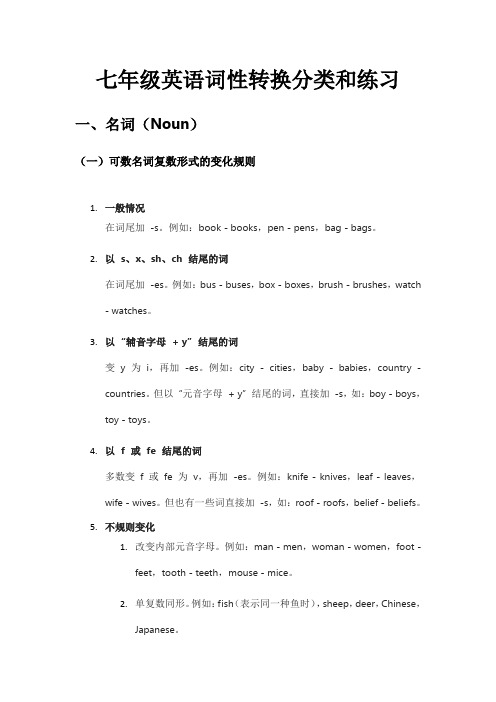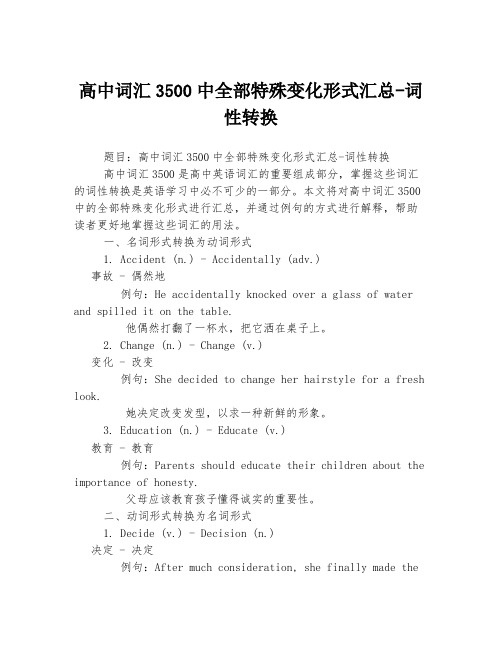词性变化和词性转换
七年级英语词性转换分类和练习全

七年级英语词性转换分类和练习一、名词(Noun)(一)可数名词复数形式的变化规则1.一般情况在词尾加-s。
例如:book - books,pen - pens,bag - bags。
2.以s、x、sh、ch 结尾的词在词尾加-es。
例如:bus - buses,box - boxes,brush - brushes,watch - watches。
3.以“辅音字母+ y” 结尾的词变y 为i,再加-es。
例如:city - cities,baby - babies,country - countries。
但以“元音字母+ y” 结尾的词,直接加-s,如:boy - boys,toy - toys。
4.以 f 或fe 结尾的词多数变 f 或fe 为v,再加-es。
例如:knife - knives,leaf - leaves,wife - wives。
但也有一些词直接加-s,如:roof - roofs,belief - beliefs。
5.不规则变化1.改变内部元音字母。
例如:man - men,woman - women,foot -feet,tooth - teeth,mouse - mice。
2.单复数同形。
例如:fish(表示同一种鱼时),sheep,deer,Chinese,Japanese。
(二)名词所有格1.有生命的名词所有格1.一般在词尾加's。
例如:Tom's book(汤姆的书),the boy's mother(这个男孩的妈妈)。
2.以s 结尾的复数名词,只加'。
例如:students' classroom(学生们的教室),Teachers' Day(教师节)。
3.表示共同所有时,在最后一个名词后加's;表示各自所有时,在每个名词后加's。
例如:Lucy and Lily's room(露西和莉莉共有的房间);Tom's and Jim's bikes(汤姆的自行车和吉姆的自行车)。
词汇学-词性转换法

02 应对四六级考试中词汇运用和语法结构的考察。
在翻译实践中的应用前景
通过词性转换法,准确传 达原文含义,保持译文流 畅自然。
丰富译文的表达方式和语 言风格,提高翻译质量。
应对不同语言间的词性差 异,提高翻译的灵活性和 准确性。
THANKS
感谢观看
副词转换为形容词
技巧:在副词后加上适当的形容词词 缀,如“-able”、“-ive”等,可以
将其转换为形容词。
"possible"原为副词,表示“可能 地”,去掉词缀“-ly”后变为形容词
"possible",表示“可能的”。
实例
"active"原为副词,表示“积极地”, 去掉词缀“-ly”后变为形容词 "active",表示“积极的、活跃的”。
形容词转换为副词
技巧:在形容词前加 上适当的副词词缀,
如“-ly”、“wise”等,可以将其
转换为副词。
实例
"quick"原为形容词, 表示“快速的”,加 上词缀“-ly”后变为 副词"quickly",表示
“快速地”。
"wise"原为形容词, 表示“明智的”,加 上词缀“-ly”后变为 副词"wisely",表示 “明智地、聪明地”。
动词转换为名词
技巧:在动词后加上适当的名词词缀,如“-tion”、 “-ment”、“-ance”等,可以将其转换为名词。
输标02入题
实例
01
03
"perform"原为动词,表示“表演、执行”,加上词 缀“-ance”后变为名词"performance",表示“表
词性转换 英语

词性转换英语英语是世界上使用最广泛的语言之一,也是一门博大精深的语言。
当我们尝试用英语学习或交流时,我们需要掌握许多不同的技巧和知识,其中词性转换是一种重要的语言技能。
什么是词性转换?词性转换是指把一个单词的词性从一种类型变成另一种类型的过程。
词性是指一个单词的起着什么样的作用。
有些单词是动词,表示一个动作;有些单词是名词,表示一个“东西”;有些单词是形容词,表示一种特征。
词性转换就是把一个单词从一种类型转换成另一种类型,以便更好地表达某个意思或使某个句子更有意义。
举个例子,你可以把动词“run”换成形容词“running”,来表达“跑步”的意思。
你也可以把形容词“hot”换成名词“heat”来表达“高温”的意思。
重要的是,理解词性转换的原则,这样才能更准确、更自然地表达自己的意思。
其中,有几种比较常见的转换原则:1.词转换成名词:在动词后加上“-tion”,比如, educate -> education; refer -> reference; apply -> application2.词转换成动词:在名词或形容词后加上“-ize”,比如, terror -> terrorize; modern -> modernize; nation -> nationalize3.词转换成形容词:在动词后加上“-ing”,比如,develop -> developing; concern -> concerning; defend -> defending4.容词转换成动词:在形容词后加上“-ify”,比如,false ->falsify; modern -> modernify; brave -> brafify5.词转换成形容词:在名词后加上“-al”,比如,nation -> national; courage -> courageous; success -> successful 还有许多其他的转换原则,包括使用后缀、前缀、不同的变体等等。
第三讲 词性转换(构词法)

第三讲词性转换(构词法) [思维导图]一、动词、形容词转化为名词的规律1.动词变名词的后缀后缀例词-ion/-tion/ -sion/-ation correct→correction改正celebrate→celebration 庆祝;庆祝会attract→attraction 吸引conclude→conclusion 结论;结束discuss→discussion 讨论;辩论decide→decision 决定admit→admission 接纳;准许入学invite→invitation 邀请explain→explanation 解释graduate→graduation 毕业expect→expectation 期望-er/-or drive→driver司机;驾驶员gather→gatherer 收集者;采集者teach→teacher 老师announce→announcer 广播员conduct→conductor 指挥;售票员-ment punish→punishment惩罚achieve→achievement 功绩;成就argue→argument 辩论;论据2.形容词变名词的后缀二、名词、动词转化为形容词的规律energy →energetic 精力充沛的[名师指津] -ed形容词多表示主语所处的状态,意为“感到……的”,通常修饰人;-ing形容词多表示主语所具有的特征,意为“令人……的”,通常修饰物或事。
三、形容词转化为副词的规律类别例词直接加-ly clear→clearly清楚地great→greatly 很,大大地以辅音字母+y结尾的形容词,变y为i再加-ly happy→happily高兴地heavy→heavily 沉重地词尾为ble/le的形容词,去掉e,再加-y terrible→terribly可怕地gentle→gently 轻轻地词尾为ue的形容词,去掉e再加-lytrue→truly真实地词尾为ll的形容词,直接加-y full→fully充分地dull→dully 迟钝地词尾为-ic的形容词,加-ally basic→basically 主要地scientific→ scientifically 合乎科学地厘清两种情况,突破词性转换从句法功用上看,厘清“修饰与被修饰”1.名词在句中作宾语,被冠词或形容词或形容词性物主代词所修饰[例1] She is determined to carry on with her________(educate).(2017·全国卷Ⅲ) [分析] education[前面有形容词性物主代词her,此处应该使用动词educate的名词形式education作宾语。
高中词汇3500中全部特殊变化形式汇总-词性转换

高中词汇3500中全部特殊变化形式汇总-词性转换题目:高中词汇3500中全部特殊变化形式汇总-词性转换高中词汇3500是高中英语词汇的重要组成部分,掌握这些词汇的词性转换是英语学习中必不可少的一部分。
本文将对高中词汇3500中的全部特殊变化形式进行汇总,并通过例句的方式进行解释,帮助读者更好地掌握这些词汇的用法。
一、名词形式转换为动词形式1. Accident (n.) - Accidentally (adv.)事故 - 偶然地例句:He accidentally knocked over a glass of water and spilled it on the table.他偶然打翻了一杯水,把它洒在桌子上。
2. Change (n.) - Change (v.)变化 - 改变例句:She decided to change her hairstyle for a fresh look.她决定改变发型,以求一种新鲜的形象。
3. Education (n.) - Educate (v.)教育 - 教育例句:Parents should educate their children about the importance of honesty.父母应该教育孩子懂得诚实的重要性。
二、动词形式转换为名词形式1. Decide (v.) - Decision (n.)决定 - 决定例句:After much consideration, she finally made thedecision to study abroad.经过深思熟虑,她最终决定出国留学。
2. Excite (v.) - Excitement (n.)激动 - 兴奋例句:The children couldn't hide their excitement when they saw the presents under the Christmas tree.孩子们看到圣诞树下的礼物时,高兴得无法掩饰。
英语单词词性转换

英语单词词性转换一、动词v.→名词n.1、词尾加上-er或-or之后就变成了表示"某一类人"的名词例如:work—worker, teach—teacher, sing—singer,jump—jumper, play—player, learn—learner,visit—visitor, invent—inventor,collect—collector等.注意:1以不发音的e结尾的动词,在词尾加-r.例如:drive—driver, write—writer等.2以辅音字母开头并以元音字母加辅音字母结尾的单词,应双写末尾的辅音字母再加er; 例如:run—runner, win—winner,begin—beginner等.2.在动词词尾加上-ment 变成名词例如:achieve—achievement 成就advertise—advertisement例如:argue—argument争论3.在动词词尾加上-tion/sion变成名词例如: attract—attraction; instruct—instruction;invent—invention discuss—discussion;express—expression educate—education;graduate—graduation; operate—operation 去e再加"ion"compete—competition; organize—organization 把e改成其他字母再加"tion"decide—decision conclude—conclusion 把de改为s再加"ion"describe—description描写,描绘这是特例,不规则变化4.在动词词尾加上-ance变成名词例如: appear—appearance 外貌;出现perform—performance 演出accept—acceptance 接受resist-resistance n.抵抗,阻力5.在动词词尾加-ing变成名词方法与动词变为现在分词的方法相同例如:meet—meeting build—building wait—waitingbathe—bathing say—saying谚语 mean—meaning注意:以辅音字母开头并以元音字母加辅音字母结尾的单词,应双写末尾的辅音字母再加-ing 如:swim—swimming shop—shopping begin—beginning二、动词v.→形容词adj.1.动词后面加able,以e结尾的动词则去e加able,表示具有此性质,特点或属性.例如: afford-affordable;love-lovable2.动词后面加ed,以e结尾的动词则直接加d,表示被动性的属性或特点.例如: scatter-scattered use-used3不规则的动词则必须记忆,记住其过去分词形式.规律不大,意义同b.三.名词n.→形容词adj.1.在名词后面加-y可以变成形容词尤其是一些与天气有关的名词例如: rain—rainy, cloud—cloudy, wind—windy, snow—snowy,health—healthy, luck—lucky,anger—angry guilt—guilty内疚的tourist—touristy游客多的 , salt 盐—salty 咸的silk丝绸—silky丝绸般的, sleep—sleepy 昏昏欲睡的注意:1如果以辅音字母开头并以元音字母加辅音字母结尾,这时应双写辅音字母再加"-y".如: sun—sunny, fun—funny, fog—foggy有雾的, fur—furry毛皮的2少数以不发音的e结尾的名词变为形容词时,应去掉e再加"-y".如: noise—noisy, ice—icy, shine—shiny发亮的, taste口味—tasty甜的2.名词后面加-ed,以e结尾的直接加d.例如: spot斑点—spotted有斑点的; talent—talented 有天赋的organize—organized 有组织的; balance—balanced平衡的3.一些抽象名词在词尾加-ful可以变为形容词例如:care—careful, thank—thankful, help—helpful,use—useful, meaning—meaningful4.在名词后加-less构成含有否定意义的形容词例如:care—careless粗心的, use—useless无用的hope—hopeless没希望的,home—homeless无家可归的5.一些以-ce结尾的名词,把-ce改为-t变成形容词例如: difference—different, silence—silent, confidence—confident 6.在名词后加-ly变为形容词例如: friend—friendly, love—lovely, live---lively7.在名词后加-ous变为形容词例如: danger—dangerous prosperous a 繁荣的pro 在前+sper 希望+ous 8.名词后面加-al变为形容词例如: music—musical; medicine—medical 这个比较特殊9名词后面加-able变为形容词,如果以e结尾就去e再加"-able".例如: adjust—adjustable 可调整的 value—valuable有价值的10.名词后面加-en变成形容词例如: wood—wooden 木制的 wool—woolen 羊毛的四.形容词adj.→副词adv.▲一般在形容词的词尾加-ly可以变成副词例如: quick—quickly, slow—slowly, loud—loudly, sudden—suddenly 等例如:possible—possibly, terrible—terribly。
初中英语语法单词词性知识点总结归纳及词性转换规律
初中英语单词词性知识点总结及词性转换规律1.名词(1)名词的可数与不可数可数名词指表示的人或事物可以用数来计量,它有单数与复数两种形式。
不可数名词指所表示的事物不能用数来计量。
物质名词与抽象名词一般无法用数目,来统计,都成为不可数名词。
不可数名词前一般不能用冠词a、an来表示数量,没有复数形式。
要表示“一个……”这一概念,就须加a piece of这一类短语。
要注意许多名词在汉语里看来是可数名词,在英语里却不可数。
如:chalk,paper,bread,rice,grass,news 等。
(2)名词复数的规则变化A.一般情况下加-s。
B.以s, x, ch, sh,结尾的加-esC.以辅音字母加y结尾的改y为i再加-esD.以f,fe结尾的,去掉f或fe,变成v再加-es(3)名词的所有格A.单数名词词尾加’s,复数名词词尾若没有s,也要加’s。
如:the worker's bike,the Children’ s ballB.表示几个人共有一样东西,只需在最后一个人的名字后加’s若表示各自所有,则需在各个名字后’ s。
如:This is Lucy and Licy’ s room.These are Kate's and jack’ s rooms.C.如果是通过在词尾加一s构成的复数形式的名词,只加‘。
如:the students' books, the girls' blouses(另外:名词+of+名词名词是有生命的,我们就用's结构来表示所有关系。
如果名词所表示的事物是无生命的,我们就要用名词+of+名词的结构来表示所有关系。
)2.代词人称代词,物主代词,反身代词,指示代词,不定代词(1)人称代词第一人称单数I me my mine myself复数we us our ours ourselves第二人称单数you you your yours yourself复数you you your yours yourselves第三人称单数he him his his himselfshe her her hers herselfit it its its itself复数they them their theirs themselves(2)物主代词物主代词的用法:形容词性物主代词后面一定要跟上一个名词;名词性物主代词可作主语、表语、宾语。
英语单词词根词缀和词性转换 英语单词词性转换的基本规律
英语单词词性转换的基本规律.动词(v.)→名词(n.)(a)词形不变,词性改变例如:work, study, water, plant等可以用作动词(工作,学习,浇水,种植),也可以用作名词(工作,学习,水,植物).(b)一些动词在词尾加上-er或-or之后就变成了表示"某一类人"的名词例如:work—worker, teach—teacher, sing—singer,jump—jumper, play—player, learn—learner,visit—visitor, invent—inventor,collect—collector等.注意:1)以不发音的e结尾的动词,在词尾加-r.例如:drive—driver, write—writer等.2)以重读闭音节结尾,且末尾只有一个辅音字母的动词,应双写末尾的辅音字母,再加-er例如:run—runner, win—winner,begin—beginner等.(c)在动词词尾加上-ment 变成名词例如:achieve—achievement (成就)advertise—advertisement//advertising(广告)agree—agreement disgree—disagreementamuse—amusement (娱乐) improve—improvement(争吵)commit(奉献)—commitment develop—development (发展)depart—department (局,部) govern(统治)—government(政府)manage—management (管理) equip—equipment (装备)有些单词比较特殊,需把动词后的e去掉再加ment.例如:argue—argument(争论)(d)在动词词尾加上-(t)ion/(s)ion变成名词例如: attract—attraction; instruct—instruction;invent—invention discuss—discussion;express—expression educate—education;graduate—graduation; operate—operation (去e再加"ion")compete—competition; organize—organization (把e改成其他字母再加"tion")decide—decision conclude—conclusion (把de改为s再加"ion")describe—description描写,描绘 (这是特例,不规则变化)(e)在动词词尾加上-ance变成名词例如: appear—appearance (外貌;出现)perform—performance (演出)accept—acceptance (接受)(f)在动词词尾加-ing变成名词 (方法与动词变为现在分词的方法相同)例如:meet—meeting build—building wait—waitingbathe—bathing say—saying(谚语) mean—meaningend —ending train —training wash—washing注意:以重读闭音节结尾,且末尾只有一个辅音字母的动词,应双写末尾的辅音字母,再加-ing如:swim—swimming shop—shopping begin—beginning(g)其他一些比较特殊的变化例如: Beg(乞讨)—beggar(乞丐) behave(行为举止)—behaviorknow(知道)—knowledge(知识) fly—flight (飞行)heat (加热)—heat(热量) hit (撞击)—hit( 轰动一时的人或物,碰撞)mix (混合)—mixture(混合物) press(按,压)—pressure(压力)sit(坐)—seat (座位) succeed—success(成功)tour—tour(旅游)/ tourist (游客)2.动词(v.)→形容词(adj.)(a)动词后面加able,以e结尾的动词则去e加able,表示具有此性质,特点或属性.例如: afford-affordable;love-lovable(b)动词后面加ed,以e结尾的动词则直接加d,表示被动性的属性或特点.例如: scatter-scattered use-used(c)不规则的动词则必须记忆,记住其过去分词形式.规律不大,意义同(b).3.名词(n.)→形容词(adj.)(a)在名词后面加-y可以变成形容词(尤其是一些与天气有关的名词)例如: rain—rainy, cloud—cloudy, wind—windy, snow—snowy,health—healthy, luck—lucky,anger—angry guilt—guilty(内疚的)tourist—touristy(游客多的) , salt (盐)—salty (咸的)silk(丝绸)—silky(丝绸般的), sleep—sleepy (昏昏欲睡的)注意:1)如果以重读闭音节结尾,且词尾只有一个辅音字母,这时应双写辅音字母再加"-y".如: sun—sunny, fun—funny, fog—foggy(有雾的), fur—furry(毛皮的)2)少数以不发音的e结尾的名词变为形容词时,应去掉e再加"-y".如: noise—noisy, ice—icy, shine—shiny(发亮的), taste(口味)—tasty(甜的)(b)名词后面加-ed,以e结尾的直接加d.例如: spot(斑点)—spotted(有斑点的); talent—talented (有天赋的)organize—organized 有组织的; balance—balanced(平衡的)(c)一些抽象名词在词尾加-ful可以变为形容词例如:care—careful, thank—thankful, help—helpful,use—useful, meaning—meaningful(d)在名词后加-less构成含有否定意义的形容词例如:care—careless(粗心的), use—useless(无用的)hope—hopeless(没希望的),home—homeless(无家可归的)(e)一些以-ce结尾的名词,把-ce改为-t变成形容词例如: difference—different, silence—silent, confidence—confident(f).在名词后加-ly变为形容词例如: friend—friendly, love—lovely, live---lively(g).在名词后加-ous变为形容词例如: danger—dangerous(h)名词后面加-al变为形容词例如: music—musical; medicine—medical (这个比较特殊)(i)名词后面加-able变为形容词,如果以e结尾就去e再加"-able".例如: adjust—adjustable 可调整的 value—valuable有价值的(j)名词后面加-en变成形容词例如: wood—wooden 木制的 wool—woolen 羊毛的(k)一些表示国家的名词可以在词尾加-ese, -ish或-n构成表示国籍,语言的形容词例如:China—Chinese, Japan—Japanese, England—English,America—American, India—Indian, Australia —Australian(注意Canada—Canadian)4..形容词(adj.)→副词(adv.)▲一般在形容词的词尾加-ly可以变成副词例如: quick—quickly, slow—slowly, loud—loudly, sudden—suddenly 等但是,以下几点值得注意:(a) 一些以"辅音字母+y"结尾的形容词,要把y改为i再加-ly例如: happy—happily, angry—angrily, lucky—luckily, heavy—heavily, noisy—noisily(b) 有些以-ble或-le结尾的形容词,去掉e加-y例如:possible—possibly, terrible—terribly(c)少数以e结尾的形容词,要去掉e再加-ly例如: true—truly但绝大多数以e结尾的形容词仍然直接加-ly 例如: polite—politely, wide—widely(d)以-l结尾的形容词变为副词时要在词尾加-ly,以-ll结尾的才在词尾只加-y.例如: usual—usually, careful—carefully, useful—usefullyfull—fully (以-ll结尾的才只加y)OK,以上就是英语单词词性变化的一般规律,希望对大家有所帮助PS:有些同学可能对元音辅音以及重读闭音节不是很了解,那我在这里再做下补充说明.1.英语26个字母中,a e i o u是元音字母, y是半元音字母, 其余都是辅音字母.★所谓半元音就是有时候做元音,有时候做辅音.半元音字母y做元音有: shy,sky做辅音比如最简单的:yes2.开音节和闭音节开音节分两种:绝对开音节和相对开音节绝对开音节指的是"元音字母结尾"的音节 (例如 we, hi等)相对开音节是指"辅音字母-元音字母-辅音字母-不发音的e"的音节,(r除外). ( 例如,take,make等)比如:take (在这个单词中,t是辅音,a是元音,k是辅音,e是不发音的元音)◆在开音节中, 元音字母发他们在字母表中的音闭音节, 则是指"辅音字母-元音字母-辅音字母"的音节 ( -al等除外) (例如:leg,cross等)◆在闭音节中,元音字母发不同的音a e i o u例 sat let sit not nut (试着读下这些单词,这些单词中,元音发的音都不是它们在字母表中发的音)2.英语重读闭音节就是以辅音因素结尾的,而且是重读音节的音节.比如apple 划音节就因该是ap/ple 前面那个ap是一个音节,这个音节以辅音因素p结尾,所以就是闭音节.(仅仅能看出是闭音节,是不是重读闭音节还要看这个音节是不是重读的)重读闭音节三要素:1. 必须是重读音节;2. 最后只有一个辅音字母;3.元音字母发短元音 ( 说通俗点,打个比方, /u/是短元音,/u:/是长元音)重读闭音节即两个辅音中间夹一个元音.如:sit---sitting begin---beginning(重读在gin这个音节上)●像travel这个单词,"vel"也是"辅音+元音+辅音"的结构,但是重音不在vel这个音节上,所以不用双写"l",可以为travelled,也可以是traveled,更常用的是后者.英语单词词根词缀和词性转换英语中常见的后缀一、名词性后缀1,-age为抽象名词后缀,表示行为,状态和全体总称percentage百分数,百分率,voltage电压,伏特数,lavage灌洗,洗,出法,gavage管词法,curettage刮除法,shortage 不足,缺少。
英语词性转换规则大全
英语词性转换规则大全(1)v.-n.动词转化为名词,post-postage mail-mailweigh-weight advise-advice(2)v.-n.-a.动词转化成名词-形容词act-actor / actress-activechange-change-changeable(3) v.-a.-ad.-n.动词转化成形容词,副词,名词fill-fullneed-necessary-necessarilyinterest(v. / n.) interested /interesting(4)n. a. n. a.名词转化为形容词person personal ( 个人的; 私人的)fun funny(5)n. pl. n. pl.名词转化为名词复数gentleman gentlemen human humans(6)a. ad. a. ad.形容词转化为副词possible possibly probable probably(7)a. ad. n.形容词转化为副词,名词true truly truthlucky luckily luck(8)原级比较级最高级far farther / further farthest / furthestlittle less least一、名词变为形容词的方法1. 在名词后面加-y可以变成形容词(尤其是一些与天气有关的名词)。
例如:rain—rainy, cloud—cloudy, wind—windy, snow—snowy, health—healthy, luck—lucky等。
注意:1)如果名词以重读闭音节结尾,且词尾只有一个辅音字母,这时应双写词尾的辅音字母再加-y。
如:sun—sunny, fun—funny等。
2)少数以不发音的e结尾的名词变为形容词时,应去掉e再加-y。
例如:noise—noisy, ice—icy 等。
2. 一些抽象名词在词尾加-ful可以变为形容词。
[中考英语]词性转换规则及例子
词性转换规则?动词变名词1. V+ ment 结尾Achieve—achievement 成就 advertise— advertisement/ advertising广告/广告业 agree— (in )agreement 同意 apart—apartment 公寓amuse—amusement 娱乐 argue—argument 争吵commit—commitment 奉献 comply—compliment 称赞,恭维 develop—development 发展 disagree—disagreement 分歧,争论 depart—department 局,部 experience—experiment 实验,试验 equip 配备—equipment 装备,器材 govern 统治—government 政府 manage—management 经营管理2(V+ ion 结尾attract吸引—attraction 有吸引力的事或人;令人向往的地方decide—decision 决定 conclude—conclusion 结论describe—description描写,描绘 compete—competition 竞争,比赛discuss—discussion 讨论 express表达—expression表达方式 educate—education教育 graduate—graduation毕业 operate 操作,动手术—operation 手术 organize—organization 组织,团体 instruct—instruction 指导,介绍invent—inventor / invention发明者 / 发明 permit —permission允许inspire—inspiration灵感,鼓舞人心的(物) pollute—pollution 污染predict—prediction 预言pronounce —pronunciation发音,读音 suggest—suggestion 建议,invite—invitation 邀请 dissolve—dissolvent 溶剂 solve解决—solution 解决方法 resolve 解决—resolution 决议,决心 opposite3(V+ ance 结尾appear—appearance 外貌,出现 perform—performance 演出differ相异—difference 不同点 import—importance 重要性4(V+ ing 结尾bathe 洗澡—bathing 游泳 end 结束—ending 结尾,结局 train 训练—training 训练,培训 mean — meaning 意义 say—saying 谚语 jog — jogging 慢跑 spell —spelling 拼写 write—writing 写作5(V+ 其他beg乞讨— beggar 乞丐 behave—behavior行为,举止 know—knowledge知识 fly—flight 飞行 heat 加热—heat 热量 hit 撞击—hit 轰动一时的人或物,碰撞 mix 混合—mixture 混合物 press 按,压—pressure 压力 sit—seat 座位 succeed—success成功 tour 在???旅游,在???作巡回演出(直接+地点tour China)—tour 旅游/ tourist 游客?形容词变名词1. 形容词 + nessbusy----business 商业,商务 cold -----coldness 寒冷 careless----carelessness 粗心 dark----darkness 黑暗 good ----goodness 善良美德happy -----happiness 幸福快乐 ill ---- illness 疾病 kind -----kindness 亲切仁慈 polite ----politeness 礼貌 quick ----quickness 迅速 weak ----weakness 柔弱缺点 rude ----rudeness 无礼粗暴2. 形容词 + itynational -----nationality 国籍 humid ----humidity 潮湿湿度 personal ----personality 个性人格 rapid ----- rapidity 迅速急促 real ---- reality 真实现实 stupid ----stupidity 愚蠢 able----ability能力3. 形容词 / 动词 + thheal ---- health 健康 slow ----sloth 懒惰懒散 true ---- truth 真实真相 warm ---- warmth 温暖 long ---- length 长度 strong----strength 力气强度wide ---- width 宽度 young ----youth 青春青年 grow ---- growth 生长栽培 dead ----death 死亡?名词变形容词1名词+yanger 生气—angry 生气的 hunger—hungry饿的 fog—foggy有雾的 fur—furry 毛皮的 guilt 罪恶—guilty 内疚的 health—healthy健康的 luck—lucky幸运的 cloud—cloudy阴天的,多云的 wind—windy多风的,风大的rain—rainy阴雨的,多雨的 snow—snowy 下雪多的,被雪覆盖的 sun—sunny阳光充足的 tourist—touristy 游客多的 business—busy忙碌的 salt 盐—salty 咸的 shine—shiny 发亮的 silk 丝绸—silky 丝绸般的 sleep—sleepy 昏昏欲睡的 taste 口味,品味—tasty 甜的 king—kingly国王似的、高贵的 earth—earthly尘世的 sister—sisterly妹妹般的2.名词+ edbalance —balanced 平衡的 spot 斑点,地点—spotted 有斑点的 talent—talented 有天赋的 organ—organized 有组织的 disgust—disgusted 厌恶的offense—offended 生气的 crowd群众—crowded 拥挤的 pollution—polluted 被污染的 defense—defend防卫3(名词+ ful/lessmeaning—meaningful 有意义的 care—careful/ careless 小心的;粗心的help—helpful / helpless有用的/无用的 home—homeless 无家可归的colour—colourful五彩缤纷的 pain疼痛—painful 痛苦的 use—useless/useful无用的/有用的 thank—thankful 充满感激的 peace 和平—peaceful 平静的,宁静的 playful 顽皮的,爱玩耍的 harm— harmful /harmless count—countless 无数的4(名词+ abletest —testable 可测试的 comfort舒适—comfortable舒服的 knowledge—knowledgeable 博学的 suit 套—suitable 合适的5.名词+ ousdanger—dangerous危险的 envy—envious 羡慕的,嫉妒的 mystery—mysterious 神秘的 fame—famous 著名的 glory — glorious 光荣的 hide 隐藏—hideous 非常丑陋的 industry—industrious 勤勉的industrial工业的religion —religious 宗教的 poison 毒—poisonous 有毒的 study —studious 好学的,用功的 vary改变—various 各式各样的 harmony— harmonious 和谐的poison 毒— poisonous 有毒的 study —studious 好学的,用功的vary改变—various 各式各样的 harmony— harmonious 和谐的6.ce 变 tconfidence----confident自信的 difference---different不同的7. al 结尾medicine 药----medical 医学的 music---musical音乐的---natural 自然的 person---personal 私人的 naturenation---national 国家的 education---educational有教育意义的tradition----traditional 传统的 origin起源---original 新颖的;独创的8(名词+ lyfriend---friendly友好的 live---lively 活跃的,有生气的 love---lovely 可爱的 order---orderly 有序的 elder长辈---elderly上了年纪的9.+ en 结尾wood—wooden 木制的 wool—woolen 羊毛的10. 其他energy精力---energetic 精力充沛的 fool 傻子---foolish 愚蠢的 freedom 自由---free 空的,免费的 kingdom王国---king illness 疾病--- ill生病的love---loving 慈爱的 pleasure---pleasant / pleased令人愉快的/高兴的death---dead死的popularity 流行性—popular流行的 pride---proud自豪的 scientist----scientific 科学的11.方位的词表达名词—形容词East—eastern东方的 West—western西方的 South—southern南方的North---northern北方的 In the west of China In the western part of China12.四大洲名词—形容词Asia 亚洲 ---- Asian 亚洲的 Africa 非洲----- African非洲的 Europe欧洲----- European 欧洲的 America 美洲-----American美洲的?形容词/ 名词变动词1.形容词/ 名词前后 +enjoy-----enjoy 喜欢 rich ----enrich 丰富 courage---encourage 鼓励large----enlarge 扩大 power---empower 使能;给力 join----enjoin 吩咐,命令 short----shorten 缩短 dark ----darken 变黑暗 fast牢固的---fasten 系紧 high—height---heighten 增高 long---length---lengthen 延长 strong---strength---strengthen 加强 worse ---worsen 恶化 weak----weaken 弱化sharp ---sharpen 削弱 threat威胁----threaten 威胁+ (i)fy 1. 形容词/ 名词class 等级----classify 分类 just 公平的---justify 证明有其事 person ---personify 拟人化 pure 纯净的---purify 净化 simple---simplify 简化beauty ----beautify 美化2. 形容词/ 名词 + ize /isecritic ---- criticize 批评 apology ---apologize 道歉 popular ---popularize 推广普及 global ----globalize 全球化 real ---realize 实现意识到 computer---computerize 计算机化 organ---organize 组织? 形容词变副词1( 形容词+ lybad—badly拙劣地,差地 bright—brightly 明亮地 casual—casually 随意地 clear—clearly 清楚地 complete—completely 完全 correct—correctly 正确地 final—finally最终 fortunate—fortunately幸运地 general—generally 一般来讲 loud—loudly大声地 particular 特殊的,独特的—particularly特殊地 polite—politely 礼貌地 proper 合适的,恰当的—properly恰当地 main—mainly 主要地 most 多数—mostly 多半,大多数 normal—normally 正常地quick—quickly迅速地 quiet—quietly 轻轻地,安静地 real—really真正地usual—usually recent 最近的—recently 最近;近来 hard 难的;努力地—hardly 几乎不 late 迟的—lately 最近;近来sad—sadly悲伤地 slow—slowly缓慢地 special—specially 专门,特殊地specific—specifically 特定地,明确地strong—strongly 坚决地,强烈地 sudden—suddenly突然2. 以le 结尾的去e + ycomfortable---comfortably舒服地 gentle---gently温柔地 possible---possibly可能地 simple ----simply 仅仅;只;简单地terrible---terribly极度地3. 辅音字母+ y 变 ilyeasy—easily容易地 happy—happily高兴地 heavy—heavily沉重地4.特殊well 身体健康的 true—truly真正good—well好地词—形容词—副词 ?名beauty 美,美人—beautiful美丽的—beautifully美好地care—careful仔细的—carefully仔细地care—careless粗心的—carelessly粗心地difference---different不同的---differently不同地happiness—happy高兴的—happily高兴地hunger—hungry饿的—hungrily饥饿地health—healthy健康的—healthily健康地luck—lucky幸运的—luckily幸运地noise—noisy吵闹的—noisily吵闹地pride—proud骄傲的—proudly骄傲地sadness—sad伤心的—sadly伤心地safety 安全;安全的地方—safe安全的—safely安全地silence—silent沉默的---silently 默默地success—successful成功的—successfully成功地truth—true真的—truly真正地unluck—unlucky不幸运的—unluckily不幸地wonder 奇迹—wonderful精彩的—wonderfully很好的既是形容词又是副词early get up early ; an early train late be late for class; comelate for schooldeep dive deep into the sea ; a hole deep largehigh jump high; a high mountainhard a hard question; a hard stone; work hard / study hard;rain hard long It takes too long ; It takes a long timefar jump far My home is far from school straight a straight line go straight along一、名词变为形容词的方法1. 在名词后面加-y可以变成形容词(尤其是一些与天气有关的名词)。
- 1、下载文档前请自行甄别文档内容的完整性,平台不提供额外的编辑、内容补充、找答案等附加服务。
- 2、"仅部分预览"的文档,不可在线预览部分如存在完整性等问题,可反馈申请退款(可完整预览的文档不适用该条件!)。
- 3、如文档侵犯您的权益,请联系客服反馈,我们会尽快为您处理(人工客服工作时间:9:00-18:30)。
一、合成有两个或两个以上的词合成的一个词。
如:合成名词、合成形容词、合成副词等。
fire + man ----firemangood+looking -----good-lookingany+time ----anytime一、派生1、前缀:加前缀通常改变词义反义词:un: healthy---unhealthy usual---unusualhappy---unhappydis: honest---dishonest appear---disappearlike---dislike cover---discoverim: possible---impossiblein: dependent ----independent一、派生1、前缀:加前缀通常改变词义反义词:un: healthy---unhealthy usual---unusualhappy---unhappydis: honest---dishonest appear---disappearlike---dislike cover---discoverim: possible---impossiblein: dependent ----independent2、后缀:加后缀一般改变词性(1)名词后缀:-er: manage—manager, own---owner, record---recorder report---reporter, teach---teacher, wait---waiterwin----winner, work---worker , write---writer--or: visit---visitor , act---actor, invent---inventor -ress: wait---waitress, act---actress-(t)ion: invent—invention, pollute---pollution, attract—attraction, suggest---suggestioncollect---collection, locate---location,operate---operation, protect---protectionsolve---solution, add---addition2、后缀:加后缀一般改变词性(1)名词后缀:-ation: invite---invitation, organize---organization-(s)ion: discuss---discussion, decide---decision-ment: develop---development, amuse—amusementadvertise---advertisement-ce: enter---entrance-ing: meet---meeting, paint---painting, say---saying begin---beginning, build---building2、后缀:加后缀一般改变词性(2)名词+ist ; er变成表示人的名词-ist: science--scientist, art—artist, tour—tourist-er: farm---farmer, engine---engineer, law---lawyer(3)形容词+ness, ty,ity, th, ce, dom变成名词-ness: kind—kindness, ill—illness;-ty: safe—safety, difficult—difficulty, honest—honesty-ity: electric—electricity, national—nationality,active—activity, able—ability-th: true—truth, long—length-ce:different—difference, important—importance-dom: free—freedom, wise—wisdom,(2) 动词后缀:1.名词+ize变成动词:-ize: memory---memorize2. 形容词+en 变成动词:wide—widen(3). 形容词后缀:1.名词+ed, ful, y, ly, ive, al, cal, en, (i)an变成形容词-ed: age—aged, wound—wounded-ful: power—powerful, care—careful, use—useful success—successful, wonder—wonderful-y: wind—windy, rain—rainy, cloud—cloudysnow—snowy, sun—sunny, luck—luckynoise—noisy, health—healthy, fun—funny,-ly: love—lovely, friend—friendly,-ive: act—active-al: education—educational, office—official, nation—national, nature—natural, person—personal, tradition—traditional, physical—physical-cal: history—historical, chemistry—chemical, medicine—medical-en: gold—golden, wood—wooden-(i)an: Australia—Australian, Canada—Canadian Italy—Italian, America—American(4)名词+less 变成形容词,有相反的意思-less: home—homeless, care—careless, help—helpless life—lifeless, use—useless;动词+ful, able, ive变成形容词:-ful: forget—forgetful, help—helpful, thank—thankful -able: avail—available, enjoy—enjoyable, change—changeable,-ive: attract—attractive动词+ed, ing变成形容词-ed: wound—wounded, fry—fried, please—pleased, surprise—surprised, interest—interested,excite—excited-ing: amuse—amusing, interest—interestingsurprise—surprising, excite--exciting(4)副词后缀:形容词+y, ly 变副词-y: gentle—gently, possible—possibly-ly: accurate—accurately, angry—angrily,beautiful—beautifully, general—generally,clear—clearly, complete—completely, final—finally lucky—luckily, loud—loudly, main—mainly,quick—quickly, quiet—quietly, real—really,recent—recently, usual—usually, safe—safelyslow—slowly, serious—seriously, soft—softlywide—widely, true—truly, careful—carefully,happy—happily, heavy—heavily,immediate--immediately(5)基数词后缀:-teen : four—fourteen, five—fifteen, …-ty: three—thirty, eight—eighty,(6) 序数词后缀:-th: five-fifth, six---sixth, nineteen—nineteenth, ninety-ninetieth, nine—ninth特别注意:one—first—firstly—oncetwo—second—secondly--twice1、make a phone call-----call me later2、change her idea---offer me some changes3、clean our classroom---keep our classroom clean4、be sunny and clear---clear the street5、cook food----a chief cook6、get a thorough check---check our homework7、correct our mistakes---a correct answer8、keep us cool---cool the milk9、in the dark---dark brown10、from a desire to become rich---desire happiness11、leave early-----early morning12、on my other hand----hand me his book13、a hard apple----work hard14、hurry to school ----in a hurry15、look like ----have a look at16、work late ----at a late hour---be late for17、process our problem ---a long process18、water flowers---enough water19、weak light----light enough for me to lift20、walk straight----a straight line21、some books---book a hotel22、break the rules----have a break23、a bright boy----a pair of bright eyes24、a book in a case----deal with a case25、catch the bus---catch the thief—catch a cold---catch what you said26、live in the country----work for our country27、walk through the crowd----be crowded with28、my dear---a dear earring29、my experiences in England----be full of experience30、I don’t know if…,////If it rains,….31、run fast----run a restaurant32、happen to do / happen on Friday33、manage to do sth./ manage a company34、the rest of time / have a rest35、be present a meeting----give me a present----at present36、still live there-----keep still/stay still----still taller37、take away---take notes---take a pill---take a bus----It takes sb. some time to do…-----take photos38、look after patients-----be patient to students39、Yes, I will.-----Will you…..------a strong willWhen there is a will, there is a way.40、by train----train us to be excellent ones41、get along/on with sb. ----- get along /on with our work42、go ahead , you’ll find a school on your right.-----May I ask you a question? Go ahead.43、go in for = take part in------go in for = be fond of44、our plane will take off-------take off your coat45、look up at the Oriental Pearl TV Tower= look up a word in the dictionary46、run/ be out of food--------walk out of the classroom47、put on my coat---put on my glasses----put on a play48、take place= be held; take place= happen。
